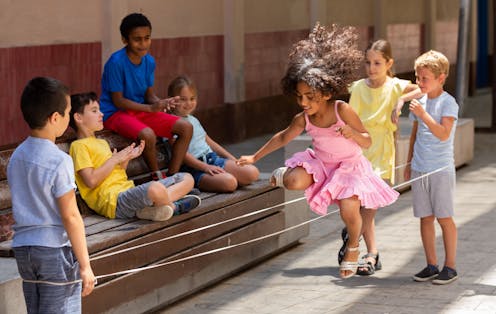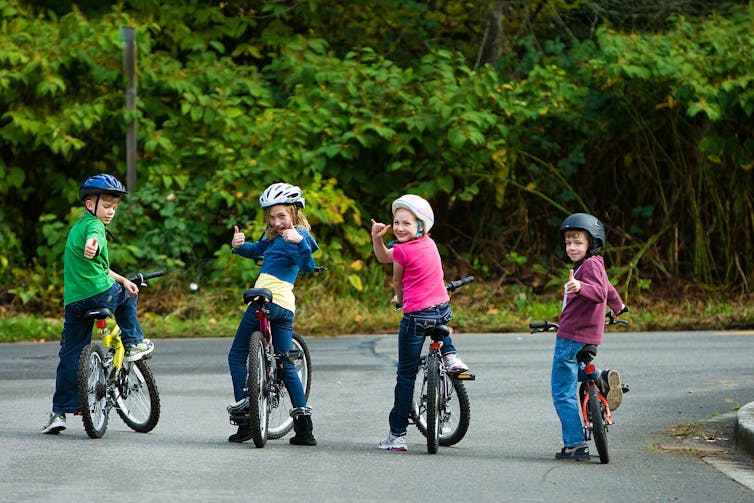
Children no longer play freely in driveways, on their streets or in urban parks and courtyards. In many places, children’s freedom to roam has been diminishing for generations, but the pandemic has hastened the decline of this free play.
Since the pandemic, children’s physical activity has become ever more structured. It now mostly happens in after-school or sports clubs, while informal, child-led play continues to decline.
In many cases, children don’t have easy access to purpose-built spaces like playgrounds. They need adults to get them there. Without the use of more informal spaces to spend time with other children, this means they often lack daily opportunities for play.
Unstructured play happens when children are given the opportunity to behave freely in spaces with other children. They will often need support from adults – such as through supervision – to help them play safely.
Get your news from actual experts, straight to your inbox. Sign up to our daily newsletter to receive all The Conversation UK’s latest coverage of news and research, from politics and business to the arts and sciences.
Play – and especially unstructured opportunities for play – is essential for children. Beyond providing opportunities for physical activity, play is good for children’s development. It helps them to push boundaries, find ways of exploring friendships and resolving conflicts, and to stretch their imagination and creativity.
Schools are important for encouraging play. They can, for instance, combine play with potential benefits for physical activity levels, and with compassion for the environment and an interest in climate change and biodiversity.
But they are not the sole solution. Supporting play needs to reach beyond the school gates.
Urban play
The charity Playing Out has been working in Bristol, where we are based, and in many other cities across the UK to champion community-led “play streets”. Residents apply to their local council for temporary road closures, which allows them to let their children play on the street without fearing passing cars. Parents and carers supervise resident children to play outside their houses.
Finding ways to encourage children to play in places such as driveways, courtyards, and on their streets can also help with their independence in the outdoors. The three of us have worked on a variety of research projects on children’s interaction with the urban environment.
Lydia is involved with children and families living in an urban area of Bristol, exploring how to get children to play in these urban pockets of space. The “OK to play” project intends to create a toolkit to help families enhance these small threshold areas, such as driveways, into play spaces.
The experience of COVID lockdowns worldwide emphasised the importance of green spaces and nature for all of us in maintaining good levels of physical and mental health. This was often particularly challenging for children who lived in cities without easy access to gardens or green spaces.
Debbie has worked with artists and primary-aged children on the “What does nature mean to me” project. The children explored green spaces in Bristol, collecting natural materials for collages as well as painting, drawing and taking photographs.
The children were fascinated to see that nature resides even in the most urban places. Making art as well as spending time freely in natural spaces gave the children opportunities to explore big ideas: their hopes and fears for the future and what their role might be in the climate crisis.
Helping play happen
Adults have a crucial role in making being outside safer for children’s play. What the projects we’ve worked on have in common is willing adults who see the value of unstructured play, who can enthuse children, put in place structures to make being outside safer and support each other in enabling more children to engage in their right to play.

If you’re a parent or carer, you can take action. You could start by considering how you prioritise how your children spend their time. This might mean signing up to one less activity class, and instead using that regular time to supervise your children – and perhaps offering to supervise friends or neighbours’ children, too – as they play freely in your driveway, courtyard or other urban pocket.
Perhaps you could share this supervision with other parents. Social structures that build trust and make places feel safe can unlock the freedom for unstructured play.
But investment from local and central government is needed to support unstructured play, too. Tom has worked with communities, professionals and researchers getting together to look at the opportunities and barriers in the urban landscape around them.
This can make a persuasive case for local decision-makers to fund improvements. Strong, sustainable communities help people feel safe, connected, and supported, which can lead to better lives.
Debbie Watson receives funding from ESRC and AHRC. She is affiliated with the Labour Party.
Lydia Collison is currently a co-investigator on a project funded through a UK Research and Innovation Frontier Research Grant. She has previously received funding through Wellcome trust.
Tom Allport does not work for, consult, own shares in or receive funding from any company or organisation that would benefit from this article, and has disclosed no relevant affiliations beyond their academic appointment.
This article was originally published on The Conversation. Read the original article.







